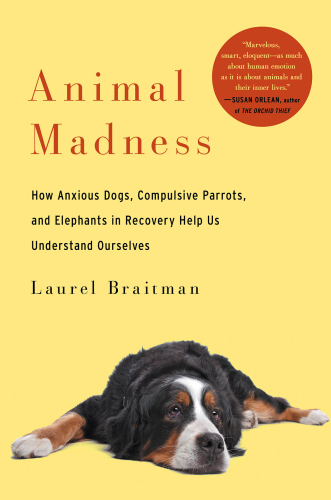
Animal Madness
How Anxious Dogs, Compulsive Parrots, and Elephants in Recovery Help Us Understand Ourselves
کتاب های مرتبط
- اطلاعات
- نقد و بررسی
- دیدگاه کاربران
نقد و بررسی

March 3, 2014
In this illuminating contribution to the burgeoning field of animal studies, senior TED fellow Braitman suggests that the key to understanding mental illness might lie in our pets. Humans, she reveals, are not the only ones who experience emotional turbulence or mental problems that break daily routine. Bears can endure heartbreak, elephants can form intense social attachments, and gorillas can die from homesickness. Few species escape her discussion. Braitman’s delightful balance of humor and poignancy brings each case to life as she draws on her own experience, research, and the theories of Darwin, Descartes, and others. We have always described animal behavior using human terminology, and analyzing these accounts in historical context leads to revelations about the human species and larger issues of language and communication. Yet emotion is in part contingent upon the ability to express it, so the varied capacities for self-awareness and language within the animal world are perhaps the only possible loopholes to Braitman’s logic. But analytical scrutiny would not be the way to approach this book, whose continuous dose of hope should prove medicinal for humans and animals alike. Agent: Barney M. Karpfinger, Karpfinger Agency.

April 1, 2014
Eschewing statistics and experimental data in favor of her own stories and historical anecdotes, Braitman, a trained historian of science, appeals directly to her readers' emotions with tales of anguished elephants and heartsick gorillas. The writing, informed by the author's academic background, relies heavily on the views of 19th-century naturalists, e.g., Charles Darwin and William Lauder Lindsay, although Braitman does cite such modern ethologists and psychologists as Mark Bekoff and Jaak Panskepp. Braitman highlights the similarities between human and nonhuman emotion but seems focused on proving that nonhuman animals can feel. The author's book is more overtly evangelical than Virginia Morell's Animal Wise: The Thoughts and Emotions of Our Fellow Creatures, but both titles make similar arguments: that the time has come to rethink our ban on anthropomorphism, that beasts can indeed think and experience other senses, and that we ought to do more for (and less to) our furry and feathered cousins. VERDICT This engaging, compassionate read will touch the hearts of animal lovers but is unlikely to convert skeptics. Readers in search of a straightforward review of current animal-cognition literature may be put off by Braitman's inclusion of details from her personal life and should turn to Morell's book, mentioned above, instead.--Kate Horowitz, Washington, DC
Copyright 2014 Library Journal, LLC Used with permission.

May 1, 2014
Humans aren't the only animals that suffer from emotional thunderstorms, and author Braitman came to the same conclusion that Charles Darwin arrived at: that nonhuman animals can suffer from mental illnesses that mirror those that humans endure. Starting her fascinating account of animal neuroses with her own dog, who snapped at nonexistent flies and jumped out of a fourth-floor window, Braitman began to read scientific papers and historical literature, eventually traveling to many countries in search of troubled animals and to observe what people did to help them. She found parrots that plucked out their feathers and primates who pulled out their hair, elephants that were so aggressive that their mahouts feared for their lives, tigers with facial tics, and a neurotic donkey who loves massages. The wonderful thing she discovered is that it is possible for these animals to heal, a message crystallized by her encounters with friendly gray whales who sought out human contact, even though they still bore harpoon scars from the whaling days. Acknowledging mental illness in other animals, and helping them recover, obviously can be a comforting experience.(Reprinted with permission of Booklist, copyright 2014, American Library Association.)

























دیدگاه کاربران